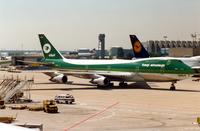August 18, 2004
Iraqi Airways
By Kevin

There are approximately 108 airports and airfields throughout Iraq. Baghdad and Basra both have international airports, while Mosul, Kirkuk and Irbil have domestic airports.Iraqis have their own share of Chutzpah; one example is the national carrier declaring in January that it intends to resume international flights, even though it cannot field even a single plane:Iraq's airports are heavily outdated, having suffered from a lack of maintenance and shortages of parts for a number of years....
Baghdad International Airport (BIA) is open and has successfully processed more than 4,500 non-military passengers since July 2003. BIA's commercial capability continues to be expanded by a number of renovations, while Basra has almost completed its commercial preparations. The evaluation of Mosul Airport's reconstruction requirements was recently concluded.The airports in Iraq have, as in many of the country's sectors, suffered from a shortage of power, water, sewage and telecommunications, with new plans for the installation of a number of communications systems necessary for safe and effective air traffic control measures, enabling safe air travel.
Iraq has invited international investors to help revive the country's national carrier by assisting in the operation of the five remaining planes from what was once a large fleet. A local newspaper advertisement said that Iraqi Airways was accepting bids to overhaul three Boeing 727s and two 747s. The planes have been inactive in the Jordanian desert and in Tunisia for more than a decade. "The planes are to be operated on joint basis, taking into consideration the experience and abilities of Iraqi Airways," reads the advert.Indeed, this terrifying photo of an Iraqi Air 727 cockpit reveals the fleet to be almost irreparable. (The tails stored in Tunisa were vandalized and ripped apart for scrap).Wars and a crippling economic embargo have wiped out most of the Iraqi Airways fleet, except for the five planes, which were moved out of the country to avoid destruction during the 1991 Gulf War. Iraqi Airways has not operated an international flight since. The US-led administration in Iraq had planned to sell off Iraqi Airways. However, the plan was scrapped following objections from the Iraqi Governing Council (IGC).
Now operating as a skeleton company, Iraqi Airways still has status as a public enterprise under the jurisdiction of the Ministry of Transport. It is not yet clear when an Iraqi Airways plane could take off, or whether indeed the fleet is still operable. Baghdad International Airport (BIA) has been closed to regular traffic since last year, although it was repaired following damage from heavy bombing during the US-led invasion.
I was going to write that there could be a thriving domestic and international aviation industry in Iraq, initially supported by cushy U.S. government contracts, and that the Iraqi authorities have chosen to shackle the industry in a bureaucratic mess. While possible, I don't think that would have been a likely outcome. The real, likely alternative to government ownership might have been a Russian-style oligarchic ownership by crooks and insiders. And I'm not about to argue that a cheap fire sale to corrupt industry neophytes is better than government bureaucrats. As detailed in this report:
Iraq Revenue Watch has obtained a confidential document that reveals plans to privatize Iraq’s air transport industry despite the CPA’s recent pledge to postpone privatization until a sovereign Iraqi government is in place. The powerful Khawwam family, which had close ties to Saddam’s regime, is set to assume control of 75 percent of Iraq’s air transport industry—bypassing any public bidding process. The deal, brokered by a senior official with the Ministry of Transport, would include the assets of Iraqi Airways, the national carrier, which at the same time is seeking to revive its operations. U.S. carriers are reportedly looking to partner with these post-war oligarchs-in-the-making.As we have seen, there is little left to the actual airline except, perhaps, airport slots and a few marginal aircraft, so how big a threat this sale presented to the future airline industry could easily be overblown.
(Note: Image from this website.)
UPDATE 8-25: Iraq to Jordan test flight completed successfully:
(MENAFN) The Director of Iraqi Airways said that the airline sent a test flight from Jordan to Iraq, the first such flight by the state airline since the 1990 U.N. sanctions on Saddam Hussein's regime, the Associated Press reported.Posted at August 18, 2004 06:19 PMAn official at the airline's Amman office said that this was a test flight and comes as part of our effort to resume regular flights by Iraqi Airways at the end of this month.
In the first stage, Iraqi Airways will fly once a week from the Jordanian capital to Baghdad, while more routes will be added later.
For now, Jordan's flag carrier Royal Jordanian Airlines and the Virginia-based Air Serv are the only two airlines with regular passenger service to Iraq.
What US govt organization has oversight of Iraqi Airways and are they active in trying to rebuild or reorganize the airline?
Comment by Jerry at July 6, 2005 05:01 PM | PermalinkIt's Iraqi-state owned, so it's unclear to me if the U.S. has any oversight over the airline's future whatsoever.
The latest press accounts say nothing about the company's plans...
but at least they know the game of corruption: Iraqi Airways put in claims for a payroll of 2,400 employees when it could justify only 400
Comment by Kevin Brancato![[TypeKey Profile Page]](http://truckandbarter.com/nav-commenters.gif) at July 6, 2005 05:11 PM | Permalink
at July 6, 2005 05:11 PM | Permalink
TrackBack URL for this entry:
http://truckandbarter.com/mt/mt-tb.cgi/166